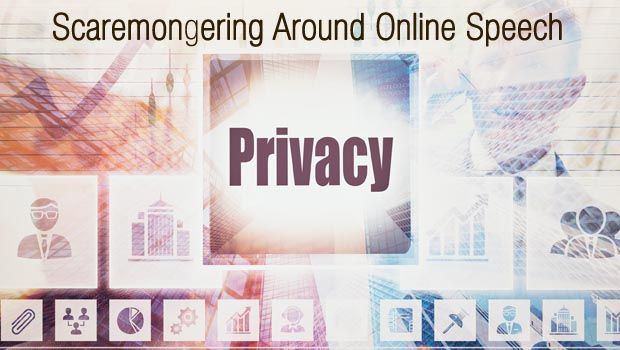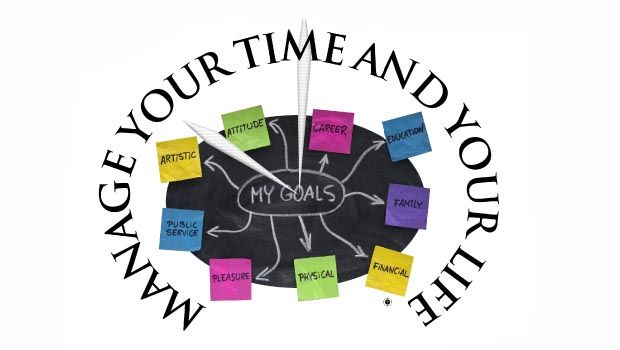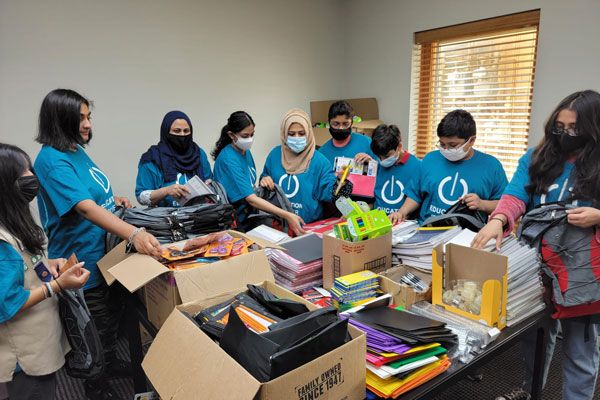The world of social media is a frightening place for many parents of Muslim children. Domestically and internationally, prosecutions of teenagers for terrorism-related offenses often cite social media activity as evidence. Police have created fake profiles to “friend” people on Facebook in order to further investigations. And Black Lives activists have been surveilled online by the Department of Homeland Security. Against this backdrop, some Muslim parents seek to prevent their children from using social media at all, or urge them not to post political views online. Parents should of course care what their children do on social media, as they care what they do offline, for many reasons. Children may not yet fully contemplate the possible repercussions of expressing views or sharing photos or location information publicly. Ultimately, any social media activity presents some reputational risk for anyone, as does any public speech. Privacy settings can alleviate some risk, but certainly not all. Ultimately, parents and families have to make their own decisions about privacy, and weigh how best to encourage children to identify and express their political voices while being aware of the risks.
Yet we must not confuse our personal choices, even if those choices are to restrict our online presence, with acceptable limits to enforce on society as a whole. While parents are wise to model and encourage awareness of online privacy for youth, we should not abdicate our rights to free speech online, or elsewhere, out of a misguided belief that some rights are superfluous or just too risky in the current political atmosphere. Doing so would seriously undermine public access to information and, consequently, prospects for advancing peace and justice domestically and internationally.
Capitalizing on Fear to Police Dissent
Some current efforts to regulate and control dissent disingenuously play upon Muslim parents’ understandable worries about social media, influencing them to push for more surveillance and policing of speech. “Countering violent extremism” (“CVE”) campaigns, for example, are sometimes claimed to provide “off-ramps” from prosecution for Muslim youth who might otherwise be charged with terrorism-related offenses. In this storyline, federal law enforcement has no choice but to prosecute youth who have given indications of potential “extremist” views. Social media is presented as an exceedingly dangerous place for Muslim youth due to terrorist recruiters’ sophisticated use of online platforms. CVE, it is claimed, could provide a safe haven where law enforcement avoid sting operations and prosecutions targeting those who express “vulnerabilities to extremism” (which could perhaps include anger at Western governments, interest in traveling to a conflict zone, or sympathy with victims of the war on terror) and instead engage mental health professionals, imams, and others to implement “interventions” — effectively, political and/or religious deprogramming — upon such a youth.
What these claims about CVE “off-ramps” overlook or obscure is that law enforcement agencies already have prosecutorial discretion. This prosecutorial discretion empowers federal investigators and prosecutors to avoid engaging in entrapment or overly aggressive prosecutions of every Muslim youth who might subjectively be labelled a potential “extremist.” Yet, in spite of this authority, many prosecutions for terrorism-related offenses are pursued in circumstances constitutional lawyers and other advocates have noted are not only constitutionally unsound but appear to be predatory upon those with mental health or other challenges. It is highly doubtful, then, that CVE collaborations between law enforcement and trusted social service professionals would protect Muslim youth who could otherwise be targeted for terrorism-related prosecutions. It is entirely possible such collaborations could increase the number of youth on law enforcement’s radar who have mental health or other challenges, or who express political dissent on social media.
At the same time as CVE “interventions” are being promoted to our communities by the FBI and other federal law enforcement agencies, Western governments have pressured social and other tech media companies to regulate speech deemed “extremist” — in ways which are unaccountable to the democratic process or formal channels for redress. In a joint statement criticizing a recent “code of conduct” in which adhering IT companies agree to police controversial online content, European Digital Rights, Access Now, and allied organizations noted the code “creates serious risks for freedom of expression as legal but controversial content may well be deleted as a result of this voluntary and unaccountable take down mechanism.” Allowing our fears about “extremist” speech and of law enforcement targeting of that speech to persuade us to relinquish speech and privacy protections would be deeply misguided. A campaign to counter vague and subjective concepts like “extremism” are not only likely to be used predominantly against dissidents in the most “suspect” of communities — including Muslim communities, Black communities, environmentalists and others — they are deeply harmful to society as a whole.
Online Speech is Speech
Limits on permissible speech online should and do exist, but they should remain consistent with limitations on free speech limits offline. For example, in the U.S., “true threats” of violence against someone, incitement to violence (speech “directed to inciting or producing imminent lawless action” and “likely to incite or produce such action”), and libel are all illegal. But the U.S. government may not constitutionally regulate speech based on political viewpoint. Similarly, social media, as with all communications, may provide evidence of a crime. However, in the U.S., constitutional Fourth Amendment protections must apply to protect against unreasonable search and seizure of private communications.
The First Amendment protects not only our ability to share information, but seek and receive it as well— with good reason. When governments are permitted to treat people as suspects for seeking information, the results are foreseeably discriminatory. States are unlikely to treat all people who seek information about a controversial topic as criminals and suspects. After all, governments employ many analysts who study terrorist movements and rely on the research of others. But in a landscape in which seeking knowledge makes you a potential “extremist,” identity-based distinctions, as to who is permitted and who is not, are likely to be drawn among those who seek knowledge. As the case of a Muslim terrorism researcher in the U.K. illustrates, being a member of a suspect community may consign you to be perpetually the subject of other people’s studies, never permitted to conduct your own.
Punishing Online Dissent
One of the primary ways social media differs from traditional media and spoken speech is in its democratizing impact. Social media theoretically provides anyone, regardless of funds or viewpoint, with an opportunity for a broad audience. Activist movements whose views do not align with the dominant print, television, and radio outlets can and do share information — including evidence of human rights abuses, and practical information to help keep activists safer — through social media.
Social Media therefore plays an essential role in spreading information about social justice struggles, including through drawing international attention more rapidly than otherwise results from traditional media channels. Yet as social media has become more popular, online speech has also been aggressively regulated in many countries in ways that criminalize viewpoints.
The prosecution of Azhar Ahmad, a young British Muslim, is one prominent example. In 2012, Ahmad was convicted of “sending a grossly offensive communication,” for having posted on Facebook his views following the killing of six British soldiers, citing his anger at the inattention to the violence against innocent Afghanis and stating he believed the soldiers deserved to die. Many readers of Ahmad’s post would find it deeply offensive. But whether something offends is an inappropriate and dangerous test for whether it is criminal. We cannot, and should not attempt to, criminalize disagreement into silence. Discussing Ahmad’s prosecution in the Guardian, Ralph Seymour observed, “it [was] disloyalty that [was] being punished, in a racialised way. The action of the police and courts is about constituting a new field of punishable conduct. And when disloyalty is punished, there really isn’t much that can’t be included under its canopy.”
It is entirely foreseeable that governments that prosecute political speech do not prosecute all speech that offends. Unsurprisingly, the viewpoints governments criminalize tend to be those that dissent from the official state narrative. Reflecting on Ahmad’s prosecution and on the 20,000 cases of social media postings investigated by UK police between 2012 and 2015, Glenn Greenwald noted, “It is … extremely difficult to imagine that Facebook users who sanction violence by the UK in Iraq and Afghanistan, or who spew anti-Muslim animus, or who call for and celebrate the deaths of Gazans, would be similarly prosecuted. In both the UK and Europe generally, cases are occasionally brought for right-wing ‘hate speech’ … [but t]he real punishment is meted out overwhelmingly against Muslim dissidents and critics of the West.”
When we recognize the reality that regulations on political speech are not, and perhaps cannot be, applied equitably, it is easy to predict that states that police political speech will target activists who challenge their own state violence. And indeed they have. Bahraini human rights activist Nabeel Rajab, who heads the Bahrain Center for Human Rights, was arrested in April, 2015 for tweets criticizing the war on Yemen by a Saudi-led coalition, of which both Bahrain and the U.S. are a part. Charges against him include spreading “false or malicious news, statements, or rumors,” “offending a foreign country” (Saudi Arabia), and “offending national institutions” (the last charge based on his speaking out about torture in the prison in which he was held).
While outspoken human rights activists are generally aware the regimes they criticize may seek to silence them, including through speech regulations where possible, the questions, issues, and fears that speech regulations present for the general population are also destabilizing and counterproductive. The ability of governments to impose fear and uncertainty on a citizenry about the permissible limits of their speech is a powerful tool for enforcing social conformity and political control. This consequence has been observed in Russia where, according to the Associated Press, in 2015, at least 54 people (out of 233 convicted) were sentenced to prison for social media “hate speech.” Russia’s extremism law criminalizes promotion of, among other things, the “exclusivity, superiority or inferiority of citizens” based on religion, and according to the U.S. Commission on International Religious Freedom, the weight of this law has been borne primarily by Muslims. The Director of Sova, a Russian human rights group, described the impacts of arbitrary prosecutions for “extremist” social media speech: “No one knows where the red line is: It’s like roulette.”
The Right, and Responsibility, to Speak
In the U.S., guarding against efforts to restrict dissenting speech — many of which focus on “hate speech” or “extremism” — has been an ongoing necessity. Neither “hate speech” nor “extremism” are currently criminalized in the U.S. — nor should they be. Due to our robust First Amendment, speech may not constitutionally be restricted based on viewpoint. And there are multiple dangers in criminalizing “hate speech” or “extremist speech.” Not only are subjective terms like “hate speech” and “extremism” difficult to define, governments tend not to apply them equitably. Such regulations also drive radical dissent, including hateful dissent, underground where it is more difficult to challenge, undermining the ability of society to advocate in an informed way for just and peaceful solutions to societal problems.
But recognition that restricting adversarial political speech — whether by labeling it “hate speech,” “extremist” or otherwise — would be unwise, impractical and unethical does not counsel in favor of our own silence. A corollary to robust speech protections is a responsibility to challenge hateful ideas with which we disagree — and not only when they emanate from the fringes of the political spectrum. As the writer Kenan Malik observed in an interview for The Content and Context of Hate Speech: Rethinking Regulation and Responses, “[W]e should be clear that what often legitimizes bigotry are the arguments not of the bigots but of mainstream politicians and intellectuals who denounce bigotry and yet accept bigoted claims… Challenging bigotry requires us to challenge the mainstream ideas that give it sustenance, and to campaign against those discriminatory social practices and laws that help make the arguments of the racists, the sexists, and the homophobes more acceptable.”
This principle is particularly apt in our current political climate, where in the U.S., election year rhetoric has led many to condemn various politicians’ bigoted statements, but comparatively little corresponding attention has been paid to current policies and practices — such as racialized policing of Black, Latino and Muslim communities under “public safety” or “national security” pretexts — which are supported by identical, if unspoken, racism. In ostensibly democratic societies, governments rely on an informed and active populace to operate in ways that promote peace and justice. Informed members of the public can more effectively advocate than those who are terrified of accessing information or expressing “extreme” views. We must therefore reclaim and maintain strong protections for social media speech, as for traditional speech. This reclamation requires us to have the courage to reject attempts to paint “extremist” views as criminal, and instead to advocate vocally for the kind of government and policies with which we want to live.






